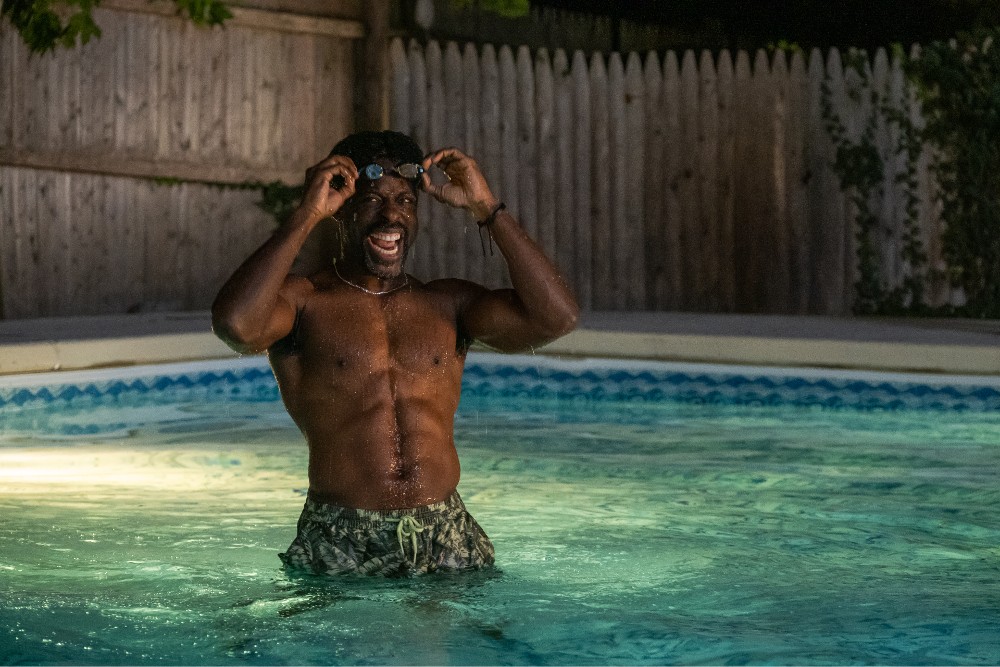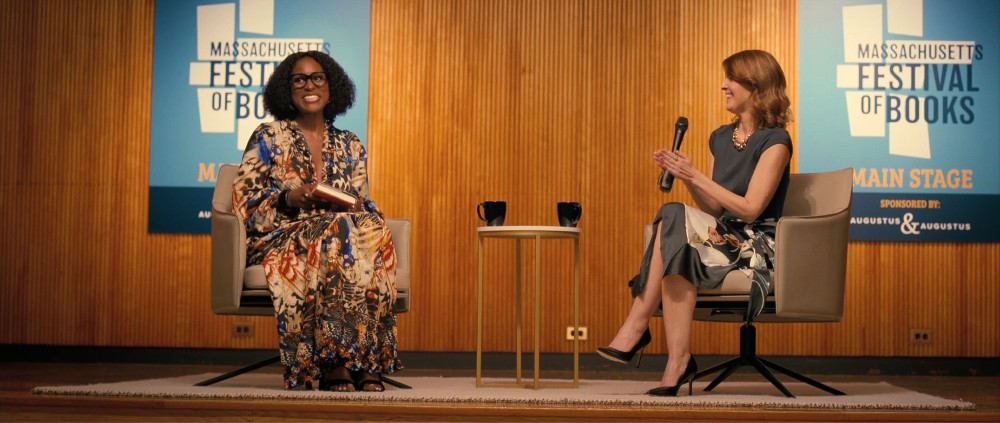
Laura Karpman makes your foot tap. Not only with her jazzy score for Cord Jefferson‘s American Fiction, but also, when she gets behind one of her pianos over a Zoom call and shows you exactly what she’s talking about. Yes, it’s an absolute delight, which is an apt description for her American Fiction score, even when the instrumentals capture Thelonious “Monk” Ellisons (Jeffrey Wright) personal and professional nightmares.
Karpman’s piano-playing provides key insights into Thelonious. For the film, the composer took inspiration from a fitting source. “Talking about American Fiction, [composer and pianist] Thelonious Monk has one of the most unique styles of any pianist composer in jazz history,” Karpman told Below the Line, “and that was something that I really played with in the score. What does Monk do? What does Monk do now?”
Karpman, who recently scored Ms. Marvel and The Marvels, spoke with Below the Line about her experience on the acclaimed drama and her creative process, including her complicated relationship with her left hand and the piano.
[Note: This interview has been condensed for clarity and length]
BTL: So you just left a fencing class, making you the first composer I know who fences. How’s that sport maybe helped you creatively?
Laura Karpman: It’s so funny, that is the first time anybody’s asked me that question, so give me a minute to figure it out. Basically the story is during the pandemic, we went up to Vancouver just to be someplace else and someplace where our son could go to school. I was with an acquaintance at that point, but now a good friend, a great documentary filmmaker named Lauren Greenfield (Queen of Versailles), and her son was fencing. Lauren said, “There’s a great fencing club here.” I thought, oh God, that might be a good sport for Benny, our son, so he did it. He took a lesson and then I thought, I have to do this.
I’ve always loved sports and I’m a good skier, but I’ve never been a terribly accomplished athlete, I suppose. At least not since I’ve been an adult. It’s always been hard for me to discipline exercise because for a lot of years you sit around, if you’re a freelancer, you’re waiting for something to happen. You’re waiting for the phone to ring, you’ve got music to write. There are a hundred reasons why not.
But this sport, for some reason, drives me. I just love that it is an incredible combination of using your brain and using your body. It’s very much like music. Are you a musician?
BTL: No, I’m not.

Karpman: When you’re learning piano, let’s say classical piano, you play hanon exercises, which are basically scales. It’s very much like that where you learn all of these moves and exercises, and then when you go to fence, you try to implement them and then, of course, everything completely falls apart.
But it’s really good for me because I’m a competitive person and it’s competitive, but it’s a thinking kind of competition. Also, this gets really deep in the weeds…. I’ve been in deep in the weeds conversations for the past two days. It’s…
BTL: It’s the end of the year.
Karpman: Yeah, it is. I think when I grew up, there was a lot of confusion about left-handed people. I wrote with my left hand and did everything, but I played all sports with my right hand because when you went to school, they made you throw a ball with your right; it was just what you did in those days.
It actually relates to American Fiction, and the way that it relates to American Fiction is because I’ve always had this complicated relationship with my piano playing. I’ve always been a composer and a singer, and in some ways, I learned to sing because it was freeing. There was this confusion between left and right, certainly in my generation, with the piano, and it does happen with fencing. So, I started with my right hand and I switched to my left hand.
And so, the reason why it relates to American Fiction is, I’ve talked a lot about the particular piano that I’m using. With this piano for whatever reason, I don’t have those problems. It’s odd, it’s weird, it’s spiritual, it’s incomprehensible. So, there’s the very long and weird answer to your question, but I love fencing, it’s a great sport, and I wish more people knew about it and loved it too.
BTL: I have several follow-ups. A lot of artists can maybe have a trait, like playing left-handed, that’s perceived as a disadvantage but it’s ultimately advantageous for the artist. Have you experienced that with your piano playing?
Karpman: I think so. I mean, it’s so funny because I sort of beat myself up for not having a certain facility that I always felt that I should have. And my wife, Nora [Kroll-Rosenbaum], who’s a composer and a very good pianist, says, “There’s nobody who plays like you,” and she really has pushed me over the years to play. She’s been really helpful.
I remember one time I was writing this big piece called “Ask Your Mama” based on Langston Hughes poetry, and we were just messing around with the recording. Nora said, “Just play. Don’t think about it. Just play.” I did, and it was really good.
There’s this pause, which I don’t have with composing and singing, between my brain and playing the piano, but it’s gotten less and less lately. The pause really went away with this particular piano I have; something very strange about it.
BTL: It’s a lovely score. I really enjoy when the dueling pianos contrast. How many layers are there?
Karpman: There’s a lot of multiple layers of piano. There’s a real piano concerto in “My Pafology” when he’s giving the monologue at the very end of the writing scene. I think it’s two or three layers of piano. But that’s a really good example of me playing and feeling free to play in a way that I haven’t really for my whole life.
BTL: I gotta say, knowing a bit about your time at Julliard and playing in clubs, I’m surprised by your complicated relationship with the piano.
Karpman: I would play in a company singing, so all the stuff was technical. I would sing because I was able to do that with alacrity without an issue. But the playing was always… Listen, 90% of the piano is me on the score. If you heard me play, you’d think I was a good player. You wouldn’t think twice about it. But I listen to Ahmad Jamal or Oscar Peterson or so many pianists, and I think, I can’t do that.
BTL: Does that make you hungrier as a musician?
Karpman: Yeah, it does. What it causes you to do, especially when it comes to kind of jazz composition, is make unusual choices. You talked about it being an advantage, and I think in that way, it is. I also have really short thumbs, like toe thumbs. So, that’s been a thing, but I think that it causes you to maybe think outside the box a little. It’s a really good thing for me as a composer.
BTL: For Monk, especially when he’s writing, how did you want to musically communicate the creative process?
Karpman: There’s such an interesting history of Hollywood making movies about what it is to create, and creation is so generally personal and quiet. And so, what Cord did was bring it to life, kind of animating it in real time, and that’s accurate in a way. At least when I think about something, sometimes I’ll write a cue or write a piece of music, I’ll be walking or thinking or at the fencing club. I’ll hear something that sparks me and I’ll think, huh, I wonder how that would work. And then you envision the music and you envision the scene and you put it all in your head in this way that feels really real, but of course is in your imagination, I suppose, on a different plane.
I think exploring the creative process and what it really is, there’s a way in which the music in that scene plays with what’s inside his head and plays with what we’re experiencing looking at the scene. So, it goes in and out of those two perspectives, almost like changing the lens on a camera where you’re seeing something close up and something far away.
The [writing] scene starts almost mysterious, I guess, and that music comes back when Monk gets up in the first ending to get the award. And then this kind of flowing piano comes in underneath it, like a second layer of piano. We’re in this [recording] room now. Normally I do interviews in the other room, but the neat thing about this room is that you can see these pianos we have in here. This here is a mono cord, so they’re single strings as opposed to three strings on the piano. It has a weird quality to it. All of that music was played on the mono chord.
And so, you have that and then you go into the piano concerto and the second part of the scene with strings and orchestra, and that’s really about almost the classicism of the monologue when he gets out there and gives that speech, even though he’s doing it in this vernacular that Monk supposedly hates.
It’s so beautifully delivered and there’s this almost theatricality to the way that he delivers the monologue. It’s that we wanted to bring out on this kind of large [piece], like it’s Hamlet or something. We were playing with this high art versus low art. It’s something that occurs a lot in the film, musically and otherwise, too.

BTL: How was it scoring multiple endings for a film? That must be a first, right?
Karpman: I mean, you’ve got three endings, right? Well, four, you’ve got the first ending which directly comes out of “My Pafology,” which feels like the ending of the movie that we’ve just seen. He gets up there, it cuts to black, and you never get to know what he’s going to say.
Then the second ending, which is a very beautiful, kind of intricately wrought version of the Monk theme with the romantic ending. So, you think that then it’s going to be the ending of a romance, and you’ve got the camera pulled back on the house, she opens the door, you think that’s going to happen, and then boom, nope. And then we get to the third ending, which is the kind of the ’90s-style drama.
The real ending is his brother picking him up at the studio, which is the resolution in some way of the story. They’re okay, they’re brothers, and they’ve worked through some stuff. And so, all of those require completely different musical treatments.
BTL: Sometimes the piano is little out of tune, and there are moments in the score where it’s abrasive. Were there certain technical flaws you wanted the score to lean into?
Karpman: Yeah, no, for sure. I mean, definitely recording on multiple pianos, some of which are out of tune was part of it. In the upright piano back there, we stuck all kinds of stuff in it. There’s a beautiful example of that in the scene where it’s a solo piano when he’s staring out at the ocean and you really hear a thoughtful, pensive version of the Monk theme, a complicated version of the Monk theme. It’s smooth, but there are these little out of tune notes that go along with it.
They were placed there at the request of Chord and Hilda [Rasula], the editor. The first version I did was straight up solo piano, very beautiful, very pensive. And they said, “It feels like there’s some stuff that needs to be a little off.” And so, I added those things and then that became something we did throughout the score. I went back and did a lot of that when you are introduced to Monk and when he arrives in Boston and things are just not going well for him.
BTL: The score is so zoned into the conflict and emotions of the story. The flute, for example, is this beautiful thing that can turn against you. Thematically, it’s all there. Who was your flute player?
Karpman: Well, the flute is a really important voice. Elena Pinderhughes is the player. Elena is a wonderful young musician who’s interning in our studio to become a film composer, and she plays with everybody. She plays with Herbie. I mean, it’s like, “Okay, are you going to be here Tuesday?” She’ll say, “I have to go to France for a day.” And it’s like, “Well, why are you going to France?” “Oh, I’m playing with Herbie.” And it’s like, “Elena, stay for two days.” “No, no, no, I’ll be right back.” I said, “Why are you going now?” “Oh, I’m playing with Terri Lyne Carrington.” So, she’s touring with A-list musicians, and she’s an incredible player, and what she has is a very warm, rich, and full tone.
She’s also a wonderful singer, and we have her singing on one of the tracks on the soundtrack as an additional thing. I just loved it so much, but it didn’t work in the film. But her playing is almost sung, and you hear her voice and her breath and her sound. Almost like Ornette Coleman, she can really do some out there gestures and make some edge sounds. And so, it’s a perfect instrument for the film because you expect one thing from it, but it sometimes gives you something else.

BTL: I wanted to circle back to the start of your career. Around your time at Julliard, you realized you didn’t want the orchestra life, that wasn’t a path you wanted to go down. How’d you arrive at that decision, and how’d it lead to film composing?
Karpman: It was a really funny thing that was unexpected. The guy I studied with was one of the great mid-century modernists and a very intellectual composer. He taught at Princeton, and then he would teach at Julliard once a week. He would teach at Julliard, because compared to the students that he had at Princeton, the Julliard people were doing stuff. It’s hard to explain, but it was more hands-on rather than intellectual musical thought. But even at Julliard, of course, it was intellectual musical thought compared to what a lot of other musicians do.
[composer] Milton Babbitt recommended that I go to the Sundance Institute. It was the first iteration of the scoring labs, and I’d never thought about film scoring. I grew up out here. My dad was a doctor in Hollywood, but I wanted to be a New York intellectual, so I was frankly a little insulted in the sense that I just thought Milton was going to recommend me for a teaching job. I wanted to be a professor.
BTL: But the Sundance Institute did it for you?
Karpman: When I went to Sundance and I saw the way that music worked with picture and the way with technology worked, those were the early days of synthesizers and sequencing music to picture, I was able to play something in and then hear it back, which is something that we do all day every day, and everybody’s used to, but at that point, it was like, “Are you kidding me? This is the best thing I’ve ever experienced in my life.”
It felt freeing to me. There was room for me musically, in a way. I felt like doing new music at that point was just hitting my head against the 21st century, which was rolling around. It felt like there wasn’t a lot of room for me, and scoring felt like it was inclusive and more open when finally I did it. Of course, I discovered that it was hardly inclusive in terms of gender and other underrepresented groups. In fact, it was historically not inclusive, but I made my way around that.
BTL: How are you feeling about 2024?
Karpman: I feel good about 2024. I mean, we’ve got two gaming projects in the studio, which are really exciting. Nora and I are writing a musical that I’m really excited to dig into, and all of this attention around American Fiction has been a surprise and a great, great pleasure. I’m really pleased about that. I’m looking forward to seeing the film continue to do well.
BTL: And you’re feeling all right as piano player? Are you good with the left hand?
Karpman: Feeling better about that. Good is a big word, Jack [laughs]. I’m feeling way better about it, and I’m actually inching my way to playing in public. I did a little bit New York, and I’m getting this She Rocks Award at NAMM, and I think I’m going to play the piano.
So yes, I am getting out there and playing at least little bits live. I should also tell you before we finish, I was joined on the score by the great Patrice Rushen, a wonderful pianist who provided such a great contrast to my playing. I really appreciated her work on American Fiction.
American Fiction is now playing in theaters.





